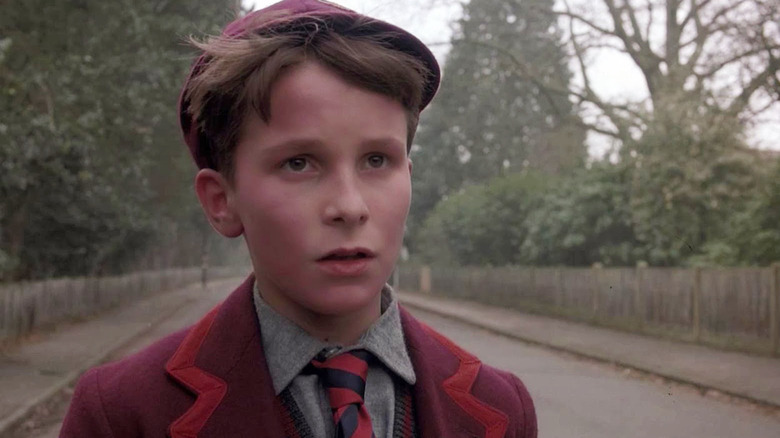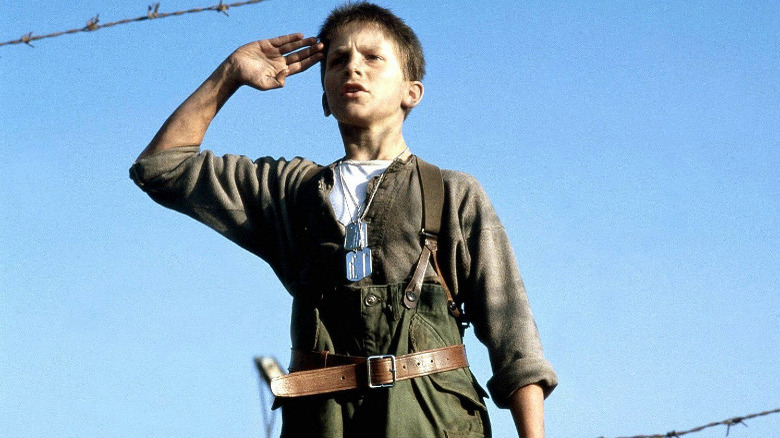Working With Steven Spielberg On Empire Of The Sun Skewed Christian Bale's Idea Of What Filmmaking Was
I'm not sure if "Empire of the Sun" is, per se, Steven Spielberg's most underrated film, but it's in the conversation. The 1987 drama was the first movie Spielberg directed after 1985's "The Color Purple," a film that saw him move beyond the type of popular genre fare and crowd-pleasing blockbusters he had made his name with. But where the latter movie has good ol' Stevie boy taking on an important story that wasn't his to tell (hence the film's complicated legacy), "Empire of the Sun" had the benefit of being a tale he clearly felt more comfortable bringing to life.
The film, which adapts J. G. Ballard's quasi-memoirish novel of the same name, stars a pre-teen Christian Bale as Jamie. He's a young British boy who enjoys a life of wealth and privilege with his family in Shanghai. Against the backdrop of WWII, Jamie is separated from his parents after Japan invades China, and is left to try and survive on his own. In an "Oliver Twist"-style, er, twist, Jamie then falls in with a shifty mentor figure (John Malkovich) and his equally-dubious cohort (Joe Pantoliano), only for the trio to wind up in a Japanese internment camp.
Most of "Empire of the Sun" is told from Jamie's wide-eyed point of view as he comes of age and endures one hard lesson after another, even as he learns to be more selfless and develop a sense of self-reliance. Admittedly, Spielberg struggles to balance moments of youthful innocence with scenes depicting the horrors of war in the film. Still, it served as a pivotal stepping stone in his own maturation as an artist, and makes for a flawed but moving piece of storytelling.
As for Bale? He's pretty good in the movie, even if it did skew his understanding of the film industry.
Not every movie is a Spielberg movie
"Empire of the Sun" had a reported budget of $35 million, a sum that went a long way in 1987 and could still go a significant distance today. Of course, Bale wasn't thinking about that at all when he made the movie. He talked about this in a video interview with GQ earlier this month, explaining:
"I had no idea just how unique that experience was at the time because I didn't realize that every film didn't build a bloody runway the planes could land on in the middle of a marshland in Spain, or build a pagoda, or build, you know, huge hospitals, to build literally half a full-size stadium out there. I didn't realize every film didn't travel to China and have, you know, 10,000 extras ... It wasn't until later when I was on much smaller films, I went, 'Oh yeah, oh, that was a big one.'"
As an adult, Bale would naturally learn to adjust to the pressures that come with making big movies. As a kid, however, he remembered, "I didn't really feel like an actual film was gonna come out of it at the end. I was just in the moment doing it." He added:
"Animals and children are the best actors. You can't compete with them. And the reason is because they don't give a s*** about the consequences. And in many ways that was how I felt when I was making 'Empire of the Sun.' You know, not through any intentional thing, it just didn't even enter my mind."
Bale's turn as Jamie might not be his all-time greatest work but is it perhaps his most natural performance for this reason. He would find out that not every movie is a Spielberg movie soon enough.

